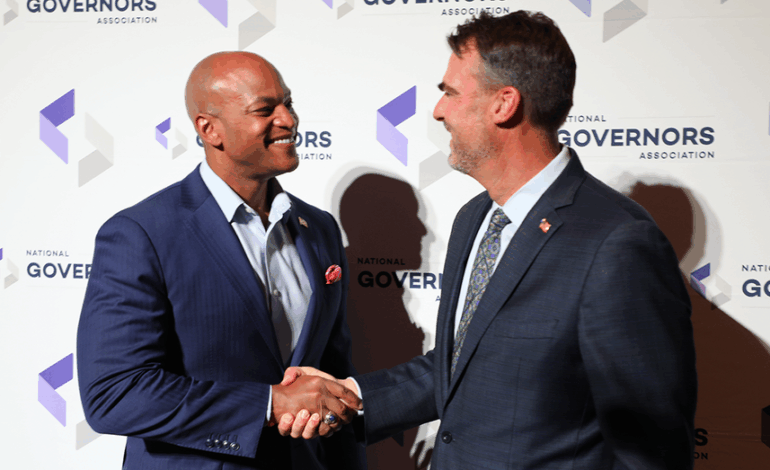Democratic Governors Challenge NGA Dues Over Trump’s Influence

The National Governors Association (NGA) is facing internal discord as some Democratic governors express dissatisfaction with the organization’s stance on issues related to President Donald Trump’s policies. At the summer meeting held in Colorado Springs, Colorado, vice chair Wes Moore, the governor of Maryland, confirmed reports that several Democratic governors are reconsidering their financial commitments to the NGA, citing frustrations over the group’s perceived inaction against Trump’s influence on state governance.
This tension was highlighted by an article from The Atlantic which revealed that governors, including Laura Kelly of Kansas, plan to suspend their dues due to what they believe is the NGA’s failure to adequately protect states’ rights. Kelly’s decision is reportedly based on her view that the NGA is not fulfilling its mission to advance solutions-focused governance, particularly in light of recent federal actions perceived as undermining state authority.
During the meeting, Moore acknowledged the validity of these frustrations, stating, “Some of the frustrations they have expressed are justified.” He emphasized that the NGA should not act as either a supporter or critic of any federal administration. This sentiment reflects a broader struggle within the Democratic Party to unify following significant political losses in the previous election cycle.
Jared Polis, the outgoing NGA chair and governor of Colorado, presided over his last meeting before handing leadership to Kevin Stitt, the Republican governor of Oklahoma. Stitt expressed disappointment over governors engaging in what he termed “playing politics” within the bipartisan organization. He asserted that the NGA ought to be a platform for constructive dialogue, rather than a battleground for political grievances.
Reports indicate that both Kelly and Tim Walz, the former chair of the Democratic Governors Association, feel that the NGA has not responded vigorously enough to federal actions, such as the suspension of federal funding earlier this year. A source close to Kelly noted that her decision to withhold dues is contingent upon the NGA’s willingness to stand firm on issues related to states’ rights.
In contrast, Eric Wohlschlegel, the NGA communications director, defended the organization’s record of bipartisan cooperation, stating that all public statements released this year reflect a consensus among governors. He emphasized that the NGA’s role is to facilitate collaboration rather than to take sides in political disputes.
The summer meeting also featured discussions with Linda McMahon, the Education Secretary, and Robert F. Kennedy, Jr., the Secretary of Health and Human Services. Polis noted that governors were particularly focused on education and healthcare issues, making the cabinet members’ participation significant for addressing state concerns.
Moore highlighted the NGA’s ongoing efforts to demonstrate its value to both Democratic and Republican governors. He stated, “The hopeful goal for the NGA is also one where we can bring our friends back into the fold.” This statement suggests an awareness of the need to address the concerns of dissenting governors to maintain the association’s integrity.
As the NGA navigates these challenges, the dynamics within the group may reflect broader political currents as governors across the country search for effective strategies to address the complexities of state governance in an increasingly polarized environment. The outcome of these tensions could shape the NGA’s future and its role as a forum for bipartisan collaboration among state leaders.






